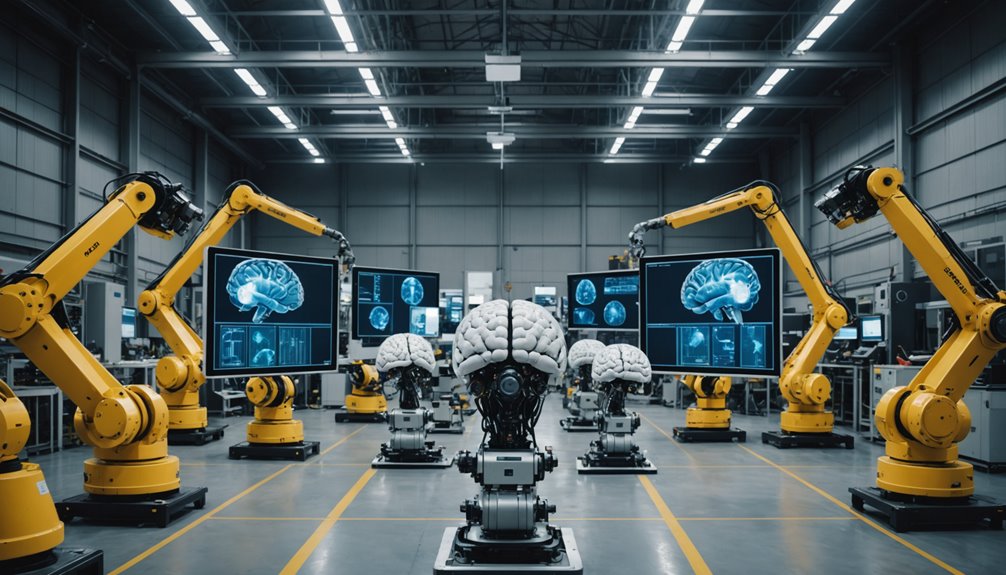Artificial Intelligence(AI) is changing the game for businesses, and AI is essential for staying competitive. It helps automate sales tasks, like responding to leads and following up with customers, saving time and boosting efficiency. With AI, businesses can deliver faster responses and keep customers engaged, which means more sales and happier clients.
As a business coach, I’ve seen firsthand how AI is essential for improving customer satisfaction. AI-powered tools can personalize communication, answer customer questions quickly, and even schedule appointments without delays. These small changes add up, making customers feel valued and keeping them loyal to your brand.
Don’t let outdated processes hold you back. Embracing AI isn’t as complicated as it seems, and the rewards are worth it. With the right tools, your business can thrive in today’s fast-moving world and leave competitors behind.
Leveraging AI to Drive Launched's Competitive EdgeKey Takeaways
- AI streamlines business operations, enhancing efficiency and driving strategic innovation, which are crucial for maintaining a competitive edge.
- AI industry growth is exponential, with a valuation projected to reach $9 trillion by 2024, highlighting its importance in business.
- Overcoming AI implementation challenges like data management and ethical issues is critical to staying ahead in a competitive environment.
- The adoption of AI in industries like finance, healthcare, and technology has led to improved services, underscoring its indispensability.
- The growing demand for AI skills in the job market underscores its significance. By 2030, AI is expected to contribute $15.7 trillion to the global economy.
AIs Role in Competitive Advantage
Artificial Intelligence (AI), the game-changer in modern business, has emerged as a critical factor in gaining a competitive advantage across diverse industries. By streamlining processes and automating repetitive tasks, AI boosts operational efficiency and allows for the allocation of the workforce to more strategic endAI’srs. AI’s ability to provide precise targeting has revolutionized marketing strategies, improving customer engagement and return on investment.
AI-driven data analysis provides practical insights that guide informed decision-making, leading to improved business outcomes. This intelligent application of technology enhances customer experience through AI-powered chatbots and recommendation engines, improving customer satisfaction and loyalty.
Moreover, AI has proven instrumental in enhancing cybersecurity and safeguarding businesses against data breaches. It also optimizes marketing efforts, which, in turn, leads to a better return on investment.
Across industries, AI applications are revolutionizing operations. From predicting equipment failures in manufacturing to detecting unusual transaction patterns in fAI’sce, AI’s role is unmistakable. Businesses are tapping into AI’s potential to deliver tailored customer experiences, drive innovation, and maintain a competitive edge. In this age of digital transformation, job postings requiring AI skills have surged by 1.9% across industries, indicating the growing demand for AI-related skills.
In addition to the above, AI is increasingly being employed to optimize inventory management by predicting product demand, thus reducing wastage and enhancing operational efficiency. This real-time inventory optimization is yet another testament to AI’s transformative potential in the modern business landscape.
Benefits of AI in Business
The application of artificial intelligence in business is redefining traditional methods, improving efficiencies, and uncovering hidden opportunities. Through AI-driven improvements, companies can automate tasks, streamline workflows, and make data-informed decisions, leading to increased productivity and reduced operational costs. With a strategic focus on these advantages, businesses can harness AI to stay competitive, meet evolving customer needs, and drive both innovation and growth. In the sales domain, AI and automation tools are being leveraged to improve response times and lead conversion rates, thus enhancing sales efficiency(#). Additionally, AI allows businesses to predict and effectively respond to maintenance needs, preventing disruptive breakdowns and ensuring optimum performance levels. These predictive maintenance capabilities are instrumental in enhancing business operations and profitability.
AI-Driven Business Efficiency
Harnessing the power of artificial intelligence (AI), businesses worldwide are reaping the benefits of improved decision-making and increased efficiency. Through AI, companies can optimize their strategic choices, manage risks, and predict future trends, all by leveraging the capability of AI to analyze extensive data sets rapidly and accurately. In an era of digital transformation, AI has emerged as a game-changing tool for businesses, helping them stay competitive and innovate.
- Improved Decision-Making: AI allows businesses to make informed decisions by identifying patterns, predicting future trends, and managing risks. This level of insight is unattainable with manual analysis alone. It also aids in business intelligence, delivering better insights and faster decisions (helping businesses stay competitive). Additionally, AI-powered automation tools can predict customer behavior, contributing to more strategic decision-making processes (predict customer behavior).
- Increased Efficiency and Productivity: AI powers the automation of repetitive tasks, streamlining workflows and optimizing resource allocation. The result is a significant increase in productivity and a reduction in labor costs. Moreover, AI leads to higher job satisfaction by removing mundane tasks, thus allowing employees to focus on more strategic and creative endeavors (Enhances efficiency and productivity through automation of tasks).
- Cost Savings and Resource Optimization: AI-driven predictive maintenance, inventory management, and energy consumption optimization can lead to substantial cost savings. Additionally, automated customer service reduces staff costs while improving service efficiency.
- Innovation and Competitive Edge: AI aids in new product development, accelerates product rollouts, and encourages innovation. Furthermore, proficiency in AI offers a competitive advantage in the job market, opening doors to career advancement.
AI-driven business efficiency is no longer a choice but a necessity in today’s competitive environment. It’s worth noting that the use of AI in business is not without its challenges, such as dealing with poor data quality and the high costs associated with implementing AI solutions. However, with careful planning and strategy, these hurdles can be overcome to reap the immense benefits that AI offers. AI is indeed essential; businesses can either embrace it to stay competitive or risk falling behind (helping companies to remain competitive).
Uncovering Opportunities With AI
With a multitude of benefits, AI is indeed an essential tool for modern businesses. It uncovers new opportunities by improving decision-making processes, enriching customer experiences, driving strategic innovation, and bolstering risk management and seAI’sty.
AI’s advanced tools automate data analysis, providing up-to-date insights that facilitate intelligent, data-driven decisions. Predictive analytics, enabled by AI, help businesses anticipate future trends, respond swiftly to market changes, and stay competitive. The ability to discern patterns and trends that might be unclear to human analysis further improves decision-making. Moreover, AI enables automation of sales operations, enhancing efficiency and precision in the sales process sales automation(sales automation).
In the domain of customer experiences, AI provides personalized interactions by analyzing customer preferences and behavior. AI-powered tools like chatbots and callboys streamline customer service, while sentiment analysis and customer feedback evaluation help businesses better understand and cater to customer needs. AI’s expertise in inventory management allows companies to meet customer demands more efficiently by predicting inventory needs and trends.
Strategic innovation is another area where AI shines. Techniques like machine learning, natural language processing, and computer vision open up new avenues for product development. AI-facilitated rapid prototyping, testing, and iteration accelerate innovation.
AI’sly, AI’s role in risk management and security is vital. Proactive risk assessment, fraud detection, and cybersecurity are all fortified by AI, reducing human error and ensuring a prompt response to potential risks. Additionally, AI has made significant strides in sectors such as healthcare, finance, and human resources, proving its versatility and potential for industry-specific applications(industry-specific applications).
Industries Capitalizing on AI

The finance sector has emerged as a pioneer in AI adoption, spearheading the push towards a future shaped by artificial intelligence. Financial services are leveraging AI for fraud detection, credit scoring, and trading, with AI-driven solutions becoming crucial to the sector by 2023. Advanced fraud detection, real-time transaction data processing, and suspicious activity identification are now powered by AI, indicating a notable change in traditional banking methodologies.
- The retail and e-commerce sectors are also leveraging AI to tailor shopping experiences, manage inventory, and gain customer insights. Canadian retailers are specifically incorporating AI to create more responsive and captivating shopping experiences.
- The AI industry has grown significantly, with total valuations reaching nearly $9 trillion in 2024. AI is transforming various sectors profoundly, from robotics to enterprise software, and reshaping industries in profound ways.
- The technology sector, known for both creating and adopting AI, is driving the limits of innovation. In manufacturing, AI is essential for predictive maintenance, supply chain optimization, and the use of collaborative robots.
- In 2024, AI will fundamentally alter business operations, affecting revenue growth, customer engagement, and new business models. 73% of US companies have already adopted AI in some areas of their business.
The integration of AI in businesses has also led to the development of advanced CRM systems, offering better lead generation and customer management. This industry-wide adoption of AI signifies a significant shift towards a future where AI is indispensable for remaining competitive.
Successful AI-Driven Companies
As we advance in our exploration of art intelligence’s crucial role, the success stories of AI-driven companies warrant our attAmazon’sAmazon’s strategic use of AI for customer customization and operational effiTesla’s Tesla’s pioneering strides in autonomous vehicles and the increasing influence of AI in financial institutions all underscore the groundbreaking power of this technology. These examples not only highlight the competitive edge that AI offers but also provide valuable insights into the future trajectory of AI across industries.
For instance, AI advances in Apple’s product development, such as the integration of AI in iPhone, AirPods, and Apple Watch, which has significantly enhanced user experience, proving that AI is no longer a choice but a necessity for businesses to stay ahead in the market (AI advancements in product development).
Moreover, looking at the explosive search growth of AI companies like Frame AI, it’s clear that global interest in AI technology is skyrocketing (explosive search growth).
One such emerging application of AI is in handling missed calls, which can have a significant financial impact on businesses (financial impact of missed calls). AI-driven sales automation solutions can manage missed calls efficiently and professionally, turning a potential loss into an opportunity for business growth and improved customer satisfaction.
Amazon AI Ad
Amazon’s successful integration of artificial intelligence is a demonstration of its game-changing power. AI has played a fundamental role in sAmazon’sAmazon’s position as a global e-commerce leader.
- AI-powered e-commerce transforms operations by predicting consumer demand, managing inventory, and enhancing search relevance. Platforms like Amazon use AI to deliver personalized product recommendations, boosting sales by aligning with customer preferences. AI also optimizes delivery routes for faster order fulfillment and adjusts prices in real time to stay competitive and maximize profits, a strategy known as pricing optimization.
- Enhanced Customer Experience: AI tailors the shopping experience by providing personalized recommendations. Amazon’s AI-powered chatbots deliver instant customer support, and AI-driven automation streamlines the buying process and enriches customer service. Through the use of AI, Amazon has been able to enhance customer journeys and lead generation, providing a more personalized and efficient service.
- Empowering Sellers: AI tools provide data-driven insights, helping sellers refine their strategies. These tools also assist in inventory management, market research, and optimizing product listings for maximum conversion rates.
- Operational Efficiency: AI integration in fulfillment centers improves picking and packing processes. AI-powered forecasting optimizes supply chain operations, and AI-driven automation reduces operational costs. AI also powers Prime Air drone delivery and aids in achieving sustainability goals through optimized operations and energy efficiency.
Teslas Autonomous InnTesla’s
Tesla’s innovation in autonomous technology reflects the game-changing power of artificial intelligence. The company integrates AI into physical applications, including its full self-driving (FSD) technology, and crowdsources data from hundreds of thousands of Tesla vehicles on the road. Their AI-driven strategy involves neural networks, supercomputing, and advanced AI for vision and planning. They also use their own AI inference chips, like the FSD Chip, to run self-driving software in vehicles.
Tesla’s autonomous innovations are set to transform individual mobility and urban landscapes and potentially reduce traffic accidents. Projects like the Cybercab robotaxi and the Cybervan demoTesla’s Tesla’s commitment to autonomous transportation solutions. These vehicles are designed with AI and cameras for navigation, eliminating traditional controls like a steering wheel or pedals. The success of these projects lies in their ability to build trust trust within post-purchase, an essential aspect that leads to loyal customers.
However, the success of these autonomous projects depends on gaining public trust and ensuring safety and reliability in different driving conditions. Tesla faces regulatory challenges that require careful navigation of legal and ethical issues. Despite these obstacles, the company plans to start fully autonomous, unsupervised FSD in Texas and California, further showcasing the crucial role of AI in maintaining a competitive edge.
AI in Financial Institutions
AI’s advancements in autonomous technology are now transforming the financial sector. Financial institutions are increasingly adopting AI solutions to streamline operations, reduce fraud, and enhance customer experiences. Notable examples include Morgan Stanley’s AI platform, NatWest’s partnership with Amazon Web Services, and Chase’s AI-powered investment services.
- AI-driven lending platforms: These platforms, such as Upstart, use machine learning to provide borrowers with fast, fair, and convenient loans.
- AI in fraud detection flags suspicious transactions or users notifies managers and strengthens security.
- AI-driven customization: Systems like Microsoft Azure enhance banking experiences through accurate insights and modernized software.
- AI for operational efficiency: Tools, such as those from SAP, automate routine tasks, reducing the time and resources required for routine activities.
These advancements are just the tip of the iceberg. As AI continues to evolve, financial institutions stand to gain more from this technology, reinforcing the notion that AI is indeed crucial to staying competitive in the financial market.
Future Prospects of AI

The burgeoning possibilities of AI are genuinely astonishing, with its widespread adoption and integration into various industries showcasing its necestoday’s today’s digital era. A staggering 73% of US companies are already utilizing the power of AI in some capacity, with the global AI market projected to expand by 33% annually in 2024. The groundbreaking power of AI is evident in its projected contribution of $15.7 trillion to the global economy by 2030.
In business, AI’s applications are wide-ranging, from customer service to personalized assistance. AI is essential in transforming industries, with nearly half of companies leveraging it for cybersecurity, fraud prevention, and tailored digital support.
Furthermore, AI’s impact on employment is significant. It is predicted to create a net gain of 12 million jobs by 2025 and further boost labor productivity by 1.5 percentage points over the next decade.
The future of AI also holds exceptional advancements in healthcare, financial services, education, media, and transportation, highlighting its potential to reshape the societal landscape. Freedom-loving readers, the AI revolution is here, and the future is ours to mold.
Challenges in AI Implementation
Despite the promising horizons that AI offers to usher in, it is not without its share of hurdles. The road to AI adoption is paved with challenges that must be recognized and addressed to utilize its full potential.
- Data Challenges: AI systems thrive on high-quality data. However, data integration, governance, and management issues AI’smar AI’s effectiveness. Moreover, maintaining data security and storage in the face of burgeoning data volumes is a significant hurdle.
- Technical Challenges: AI implementation often grapples with outdated infrastructure, scalability issues, and security risks. The complexity of AI algorithms and the need for explainability further complicate the task.
- Talent and Expertise Challenges: A shortage of AI talent and a general lack of knowledge about AI present formidable challenges. In addition, the need for employee training and effective collaboration between AI experts and domain specialists add to the problem.
- Ethical and Regulatory Challenges: AI systems can perpetuate biases and raise legal and regulatory concerns. Ensuring ethical use and managing high expectations also pose challenges to AI implementation.
These hurdles require astute strategies for effective AI adoption, which we discuss in the following section.
Solutions for Effective AI Adoption

Strategic utilization and organizational preparedness are pivotal to effectively utilizing AI’s potential. For AI to be effective, it must be integrated into business operations and customized to specific industry requirements. This can boost operational effectiveness and offer individualized solutions through predictive analytics.
Furthermore, organizational readiness is a crucial prerequisite for successful AI implementation. This involves training personnel, establishing new workflows, and a cultural transition towards embracing AI. Stakeholder collaboration is fundamental for comprehension and confidence in AI, which can be encouraged through strategic investments.
Cybersecurity considerations are equally significant in ensuring safe AI integration. AI can improve digital security by identifying and addressing threats promptly, thereby reducing risks. However, less than half of organizations are taking measures to counteract AI inaccuracies, underscoring the necessity for secure integration practices.
Here is a summary in table format:
| Strategic Utilization | Organizational Preparedness | Cybersecurity Considerations |
|---|---|---|
| Integration into Business Operations | Training and Growth | AI-Powered Cybersecurity |
| Industry-Specific Applications | Cultural Transition | Risk Reduction |
| Boosting Operational Effectiveness | Stakeholder Cooperation | Safe Integration Practices |
| Tailored Solutions | Strategic Investment | AI-Driven Threat Detection |
AI: Key to Future Competitiveness
As we consider the elements necessary for successful AI integration, it becomes apparent that AI is not just an additive to operations but a game-changing force reshaping the business environment. AI’s groundbreaking potential is reflected in its predicted contribution of $15.7 trillion to the global economy by 2030.
- AI Adoption and Competitive Advantage: Studies show that 72% of executives believe AI will be a crucial advantage in business. A remarkable 75% of companies state that AI will enable them to enter new markets and secure a competitive edge.
- Economic Impact and Growth: AI is projected to boost labor productivity growth by 1.5 percentage points over the next decade. The global AI market is poised to reach $1.81 trillion by 2030.
- Industry Transformation and Job Market: AI is set to transform industries. It is forecasted to eliminate 85 million jobs but create 97 million new ones, resulting in a net gain of 12 million jobs.
- AI Implementation Challenges: Despite its potential, AI adoption is not without obstacles. Financial constraints, technology reliance, and a lack of technical skills and expertise are among the hurdles businesses face.
AI is undeniably a key determinant of future competitiveness. Embracing this technology is not merely an option but a necessity for survival and growth in the evolving digital domain.
Frequently Asked Questions
How Can AI Help Startups to Compete With Established Businesses?
AI enables startups to compete with established businesses by automating tasks, optimizing processes, enhancing decision-making, fostering innovation, and improving customer experiences. It offers scalability, flexibility, and risk management, necessary for growth and competitive advantage.
Why is AI essential for improving sales with voice technology?
AI voice solutions ensure you never miss a lead by handling inbound calls, answering questions, and scheduling appointments 24/7. AI is essential for keeping potential customers engaged and turning inquiries into sales with lightning-fast responses.
Are There Any Ethical Considerations When Using AI in Business?
Yes, ethical considerations for AI in business include ensuring nondiscrimination, privacy, transparency, safety, and explainability. Companies must address these concerns through oversight, trustworthiness, user-centered design, responsibility, and ethical training.
Can AI Be Applied in Non-Technical Industries Like Agriculture or the Arts?
Yes, AI can be effectively applied in industries outside of technology, like agriculture and the arts. In agriculture, AI boosts efficiency through smart irrigation, crop health monitoring, and precision farming. In the arts, it aids in creation and analysis.
What Are the Potential Drawbacks of Over-Reliance on AI in Decision-Making?
Over-reliance on AI in decision-making can lead to loss of critical individual judgment, perpetuation of biases, potential ethical issues, and dependency risks. It also raises concerns about transparency, accountability, and the potential for misinformation.
How Can We Ensure the Privacy and Security of Data in AI Systems?
To guarantee privacy and security in AI systems, robust data security controls must be implemented, privacy preservation techniques must be adopted, regulatory compliance and ethics must be adhered to, and future challenges must be anticipated through advancements in encryption and federated learning.
Conclusion
In today’s fast-moving digital world, AI is essential for businesses looking to stay ahead. It can bring huge benefits, like improving efficiency and providing valuable insights, but implementing AI the right way can be challenging.
By working with experts, businesses can fully understand the value of AI and how to use it wisely. Getting AI right can make a big difference to your bottom line and set your business up for future success in an ever-evolving market. Don’t miss out on the opportunity to grow with AI!

Erik Remmel is a co-founder of Launched, a platform that helps businesses grow through AI-powered marketing, automation, and lead generation. He focuses on building scalable systems that convert cold leads into customers while streamlining operations with smart, AI-driven workflows.

